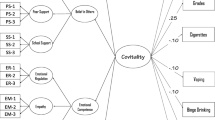Abstract
A new measure, the Strengths Assessment Inventory—Youth self-report (SAI-Y), was recently developed to assess the strengths of children and adolescents between the ages of 10 and 18 years. The SAI-Y differs from similar measures in that it provides a comprehensive assessment of strengths that are intrinsic to the individual as well as strengths associated with an individual’s interaction with his or her environment. Based on over 10 years of test development as well as previous research, the 120 items of the SAI-Y contribute to 11 content scales (e.g., Strengths at Home) and 12 empirical scales (e.g., Commitment to Family Values). The purpose of the current report is to describe the procedure that guided the development of the SAI-Y coupled with an initial study of the psychometric properties of the instrument. The SAI-Y was administered to 572 elementary and secondary school students of which 455 also completed the measure following a one- to two-week interval. Based on this data, the following psychometric properties were examined: internal consistency, standard error of measurement, and test–retest reliability. Overall, results indicated that the SAI-Y demonstrates acceptable to good levels of reliability and may be a valuable addition to current measures that assess aspects of positive functioning. Ongoing research projects and future directions are discussed.
Similar content being viewed by others
References
Beutler, L. E., Groth-Maranat, G., & Rosner, R. (2003). Introduction to the integrative assessment of adult personality. In L. E. Beutler & G. Groth-Maranat (Eds.), Integrative assessment of adult personality (pp. 1–37). New York: Guilford.
Cronbach, L. J. (1951). Coefficient alpha and the internal structure of tests. Psychometrika, 16, 297–334.
Epstein, M. H. (2004). Behavioral and emotional rating scale (2nd ed.): A strengths-based approach to assessment. Austin, TX: PRO-ED.
Epstein, M. H., & Sharma, J. (1998). Behavioral and emotional rating scale: A strengths-based approach to assessment. Austin, TX: PRO-ED.
Goodman, R. (1999). The extended version of the strengths and difficulties questionnaire as a guide to child psychiatric caseness and consequent burden. Journal of Child Psychology and Psychiatry, 40, 791–801.
Lyons, J. S., Mintzer, L. L., Kisiel, C. L., & Shallcross, H. (1998). Understanding the mental health needs of children and adolescents in residential treatment. Professional Psychology: Research and Practice, 6, 582–587.
McQuaide, S., & Ehrenreich, J. H. (1997). Assessing client strengths. Families in Society, 78, 201–212.
Murphy, K. R., & Davidshofer, C. O. (2005). Psychological testing: Principles and applications (6th ed.). New Jersey: Upper Saddle River.
Park, N., & Peterson, C. (2006). Moral competence and character strengths among adolescents: The development and validation of the values in action inventory of strengths for youth. Journal of Adolescence, 29, 891–909.
Rashid, T., & Ostermann, R. F. (2009). Strength-based assessment in clinical practice. Journal of Clinical Psychology, 65, 488–498.
Rawana, E., & Brownlee, K. (2009). Making the possible probable: A strength-based assessment and intervention framework for clinical work with parents, children and adolescents. Families in Society: The Journal of Contemporary Human Services, 90, 255–260.
Rawana, E., & Brownlee, K. (2010). The strengths assessment inventory—manual. Thunder Bay, ON: Centre of Excellence for Children and Adolescents with Special Needs.
Saleebey, D. (Ed.). (2006). The strengths perspective in social work practice (4th ed.). Toronto: Pearson.
Sattler, J. M. (2001). Assessment of children: Cognitive applications (4th ed.). San Diego: Sattler.
Seligman, M. E. P., & Csikszentmihalyi, M. (2000). Positive psychology: An introduction. American Psychologist, 55, 5–14.
Snyder, C. R., Ritschel, L. A., Rand, K. L., & Berg, C. J. (2006). Balancing psychological assessments: Including strengths and hope in client reports. Journal of Clinical Psychology, 62, 33–46.
Tedeschi, R. G., & Kilmer, R. P. (2005). Assessing strengths, resilience, and growth to guide clinical interventions. Professional Psychology: Research and Practice, 36, 230–237.
Author information
Authors and Affiliations
Corresponding author
Rights and permissions
About this article
Cite this article
Brazeau, J.N., Teatero, M.L., Rawana, E.P. et al. The Strengths Assessment Inventory: Reliability of a New Measure of Psychosocial Strengths for Youth. J Child Fam Stud 21, 384–390 (2012). https://doi.org/10.1007/s10826-011-9489-5
Published:
Issue Date:
DOI: https://doi.org/10.1007/s10826-011-9489-5




